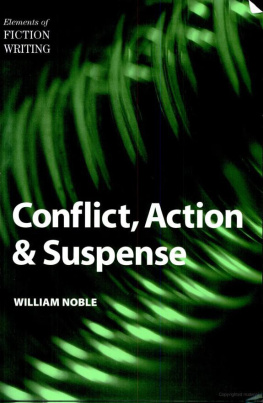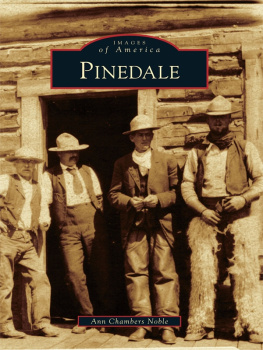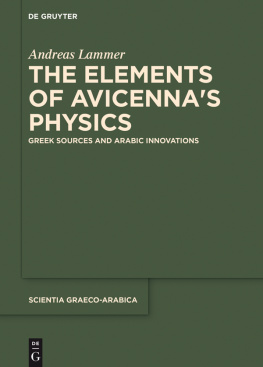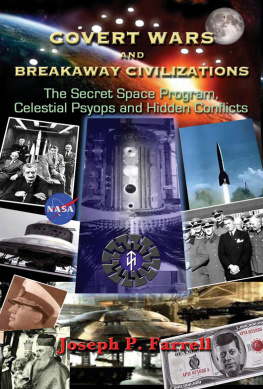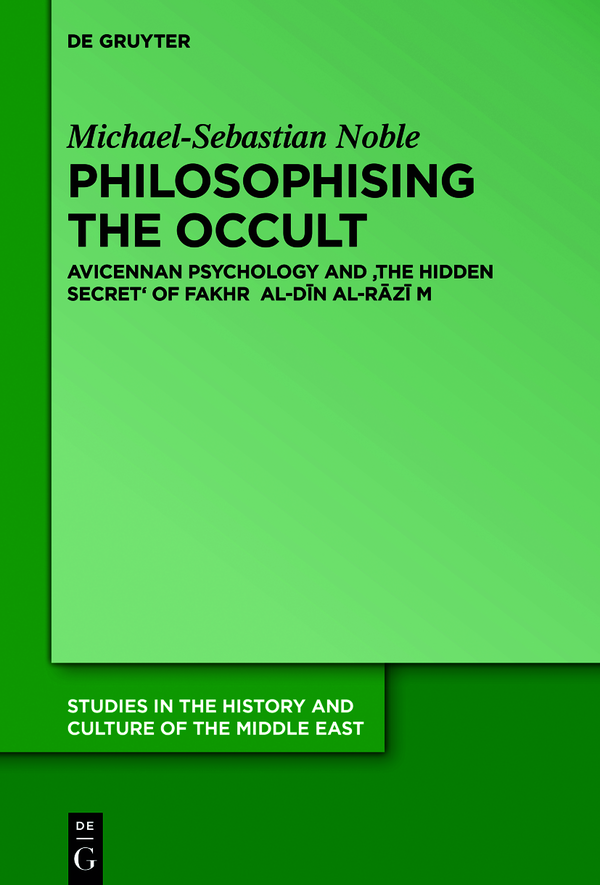Studies in the History and Culture of the Middle East
Edited by
Stefan Heidemann
Gottfried Hagen
Andreas Kaplony
Rudi Matthee
Kristina L. Richardson
Volume
ISBN 9783110644579
e-ISBN (PDF) 9783110648096
e-ISBN (EPUB) 9783110644616
Bibliographic information published by the Deutsche Nationalbibliothek
The Deutsche Nationalbibliothek lists this publication in the Deutsche Nationalbibliografie; detailed bibliographic data are available on the Internet at http://dnb.dnb.de.
2021 Walter de Gruyter GmbH, Berlin/Boston
Chapter 1 al-Sirral-maktm
1.1 Introduction
The most mysterious work of the great philosopher and theologian Fakhr al-Dn al-Rz (d. 606/1210)the renewer of the Islamic faith at the end of the twelfth centurywas al-Sirr al-maktm (The Hidden Secret).
The talisman was an earthly object into which the practitioner, by the power of his own soul, could blend the powers of the celestial spheres to affect, at a distance, and in accordance with his will, a breach of the empirical norm that patterns reality in the earthly realm. The talisman could either be a metal objectspecifically, an idol or a ringor the very person of the practitioner himself.
Identified as Sabians (al-bia), the masters of this science co-ordinated cosmology with psychology to achieve real effects in the world. For Rz, the Sabian was a practitioner of this science, irrespective of his theological commitments, his race, language, and culture. A practitioner could be a Sabian whether or not he believed in: multiple necessarily existent beings; God as the only Necessarily Existent Being, and as an agent possessed of volition (fil mukhtr); or God as the only Necessarily Existent whose creation is by way of non-volitional emanation. Since, theoretically, someone of any theological conviction could learn and practice Sabianism, it was less of a religion and more of an approach to understanding the hidden forces which determined generation and corruption in the sublunary world. It was a science. To what ends this knowledge was put would determine the extent to which it could foster the souls perfection, or hasten its debasement into pure idolatry, the pursuit of sublunary gain and immersion in corporeal pleasure.
Concurring with most of the heresiographers from the time of the early tenth century, Sabianism represented for Rz any form of astrolatry. But in the introduction of al-Sirr, it is presented as natural philosophy, grounded in the belief in an ensouled geocentric cosmos. All events in its terrestrial centre are generated by the configurations of the planets. The planets and celestial spheresthe orbits in which they moveare animated by a plenitude of spirits. The powers of these spirits can be directed by means of ritual in order to influence change in this world. Each natural phenomenon and product of human artifice has its own special occult correspondence (sing., munsaba, pl., munsabt) with the specific planet or planets which presided over its coming-to-be (udth). Planetary correspondence thus describes a special kind of ontological relationship in which sublunary effect somehow participates in the nature of its celestial principle: they share in a congenereity (mujnasa). For the Sabian, the significance of any terrestrial phenomenon derives from its participation in this infinitely complex web of celestial correspondence. Astral ritual gathers together sublunary objects of planetary correspondence and co-ordinates them with action and words to engender an intended result. Certain planets are effective for certain results: Mars for an aggressive aim; Venus for an aim relating to friendship and love.
For astral ritual to be effective, the practitioner must establish a noetic connection with the celestial spirits appropriate for his aim. To achieve this, he must purify his soul and cease its engrossment in material reality and sensual pleasure by engaging in rigorous spiritual discipline, fasting, and mental focus on the operative planet. Ritual preparatory diet serves two functions. Firstly, in ceasing engrossment with material reality, he must reduce his consumption of food to the barest minimum required to sustain life. Such privation causes inevitable imbalances in the soul and thus requires a subtle knowledge of medicine (ibb) to ensure its well-being. Secondly, consumption of ritual foods assists in establishing the desired congenereity with the spirit that is invoked.
Two major categories of Sabian astral ritual can be discerned from Rzs account. The first involves the casting of a talisman (sing., ilasm; pl., ilasmt) A talisman is an idol, cast in a mould at the astrologically appropriate time. Its metal corresponds to the operative planet: silver for the Moon; gold for the Sun; iron for Mars; lead for Saturn. Ritualised actions, mimetic of the intended aim, are then performed on or before this idol: when the practitioner enjoys a strong, stabilised noetic connection with the appropriate planet, then the intended result follows.
The second major category of astral magic in al-Sirr involves invocations which address the planets (dawat al-kawkib). It represents the central focus of al-Sirr. We shall refer to it as the planetary ascent ritual. A condition which the aspirant must fulfil before undertaking the ritual is to establish, by means of rigorous spiritual discipline, a stabilised noetic connection with his perfect nature (al-ib al-tmm). The Sabians of al-Sirr understood the Perfect Nature as a celestial spirit (r falak) that was the ontological origin of a discrete group of human souls. The heavens were inhabited by a multiplicity of such spirits, their number being commensurate to the number of discrete soul groups of which, according to the Sabians, humanity comprised.
With a noetic connection with his perfect nature established and stabilised, this celestial spirit plays a tutelary role of initiating him into the long ritual which lasts several years, providing care, guidance, and mediation with hostile planets throughout. It comprises seven distinct successive stages, observing the Ptolemaic planetary order. During each, an astral ritual is performed, and the rational soul of the planet addressed. For some stages, the aspirant is to expect a certain visionary experience. At each, the aspirant receives a sign that the planet has accepted his devotions and is willing to co-operate with his will. Then, he is to ask the planet for knowledge and power over all in the sublunary world which it governs.
Given that all change in the world of generation and corruption falls under the sway of the planets, the aspirant by the end of this long ritual will have attained knowledge of and power over everything in the sublunary world: by the power of his own soul, he wouldlike the celestial soulsbe able to command meteorological and geological phenomena such as the rain and earthquakes. Having achieved a microcosmic transformation, he would have transcended his own humanity and realised the ontological rank of the spirits which move the heavenly spheres. By means of their occult practices the Sabians were able to gain mastery and control of the imbalances of their own souls and the vicissitudes of sublunary reality.
This volume will be the first study dedicated to al-Sirr, a highly popular, problematic and unusual work. The number of manuscript witnesses affirms its popularity. The controversy which it provoked amongst subsequent Islamic scholars, some of whom could not believe that Rz wrote it, others who did, declaring him an infidel as a consequence, is evidence of its problematic nature.




